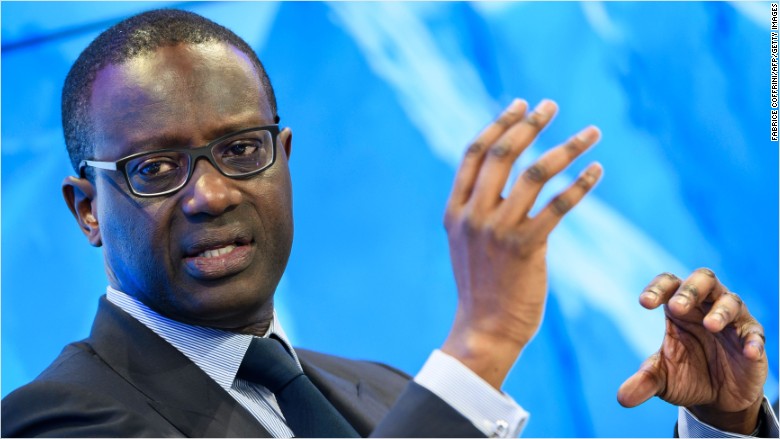
The CEO of Credit Suisse and his top deputies will have their bonus pay slashed by 40% after the bank posted an annual loss for the second consecutive year.
CEO Tidjane Thiam and 11 other top managers at the Swiss bank proposed the pay cut after shareholders "expressed reservations" about their compensation for 2016, a year in which the bank lost 2.7 billion Swiss francs ($2.7 billion).
Their proposal has been accepted by the firm's board of directors.
"I hope that this decision will alleviate some of the concerns expressed by some shareholders and will allow the executive team to continue to focus on the task at hand," Thiam wrote in a letter to investors.
It's the second straight year that Thiam volunteered to have his bonus slashed by 40%. The cut will knock more than 3 million Swiss francs ($3 million) off a total compensation package that was originally set at 11.9 million Swiss francs ($11.9 million).
The pay cuts cap a rough year for Credit Suisse (CS). The bank agreed in 2016 to pay a total of $5.3 billion to the U.S. Department of Justice to settle claims that it packaged and sold toxic mortgages between 2005 and 2007.
It also announced a major round of layoffs.

Thiam was hired into his top job in 2015 and announced a major overhaul and cost cutting program just a few months into his tenure. He wants the bank to focus on wealth management and emerging markets.
He said Friday that his top priority is seeing through the firm's turnaround.
Credit Suisse shareholders will vote on the 2016 compensation packages at the firm's annual general meeting on April 28.
Related: BP cuts CEO pay by $8 million after shareholder revolt
Credit Suisse is not the only major firm in Europe to face shareholder unease over high levels of executive compensation.
Oil giant BP (BP) announced earlier this month that it had cut the pay of CEO Bob Dudley for 2016 by 40% to $11.6 million.
The reduction follows a rare shareholder revolt last year when 59% voted against Bob Dudley's 2015 pay and benefits package, which was worth $19.6 million.
"It is clear that shareholders and other stakeholders would like our remuneration policy to be simpler, more transparent, and to lead to reduced levels of reward," said Ann Dowling, the head of BP's remuneration committee.


